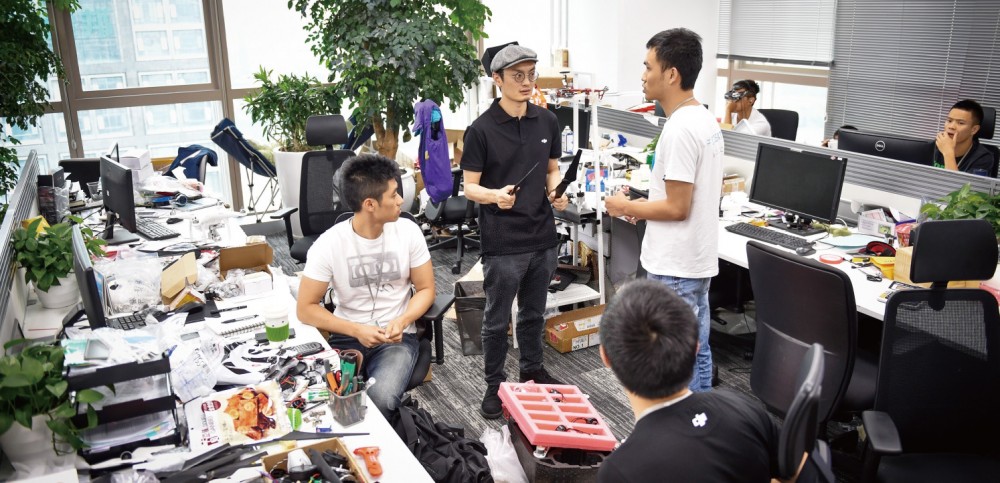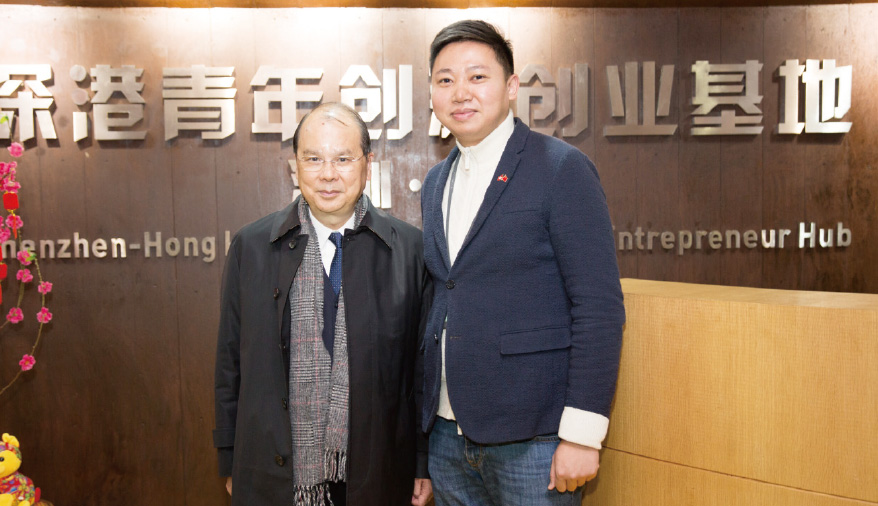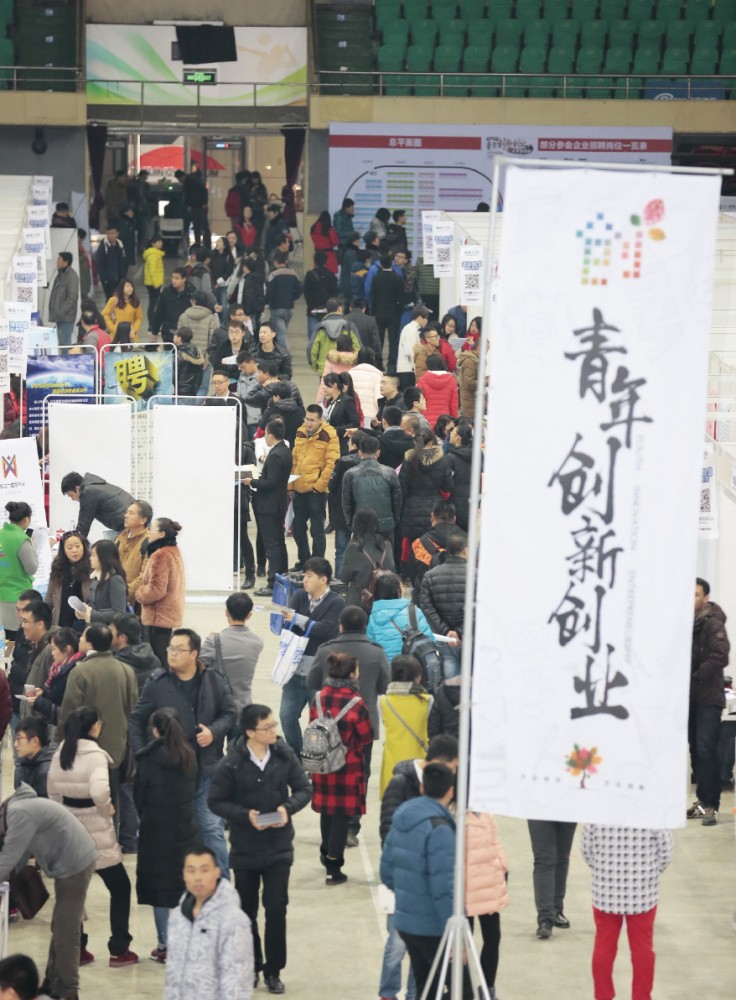As the blueprint for the Guangdong-Hong Kong-Macao Greater Bay Area is gradually being rolled out, many young aspiring Hong Kong and Macao entrepreneurs are attracted to the Mainland to realize their dreams in a market with unlimited potential. However, amid an unfamiliar environment, how should they take the first step?

Eric Yeung: Supporting Startups by Understanding the Path to Starting a Business in Mainland China
As plans for the Guangdong-Hong Kong-Macao Greater Bay Area continue to emerge, the startup ecosystem in the Mainland is bursting with opportunity, and many young people from Hong Kong are aiming to start businesses in the Mainland as a means of establishing their own brands in that market and taking an early share of the pie. However, lifelong residents of Hong Kong sometimes have a limited understanding of the business environment in the Mainland and consequently find that their businesses run into difficulty in the early stages. For this reason, the Hong Kong United Youth Association (HKUYA) and the Home Affairs Bureau (HAB) joined forces in 2019 to launch the Shenzhen Startup Services Pilot Scheme, which helps young Hong Kong entrepreneurs overcome the difficulties of starting a business in the mainland.
When the conversation turns to the subject of the Scheme’s mission, Eric Yeung, Chairman of HKUYA, replies that he has seen many young Hong Kong people encounter a range of administrative issues when starting businesses in the Mainland. Examples include how to apply for a business bank account and identify the appropriate startup grant programmes. The creation of the Scheme was therefore intended to provide a variety of different forms of support for young entrepreneurs at this critical juncture, in order to smooth their path to startup success.
Understanding government policy and integrating into the Mainland market
 As Yeung sees it, Hong Kong’s young entrepreneurs have an international outlook and are farsighted in terms of market development, as well as exhibiting a good degree of flexibility in terms of marketing and promotion; however, they often lack awareness of the life and culture in the Mainland. “For this reason, a lot of successful startups hire locals to join their team or work with local partners, enabling to achieve far more with much less hassle.”
As Yeung sees it, Hong Kong’s young entrepreneurs have an international outlook and are farsighted in terms of market development, as well as exhibiting a good degree of flexibility in terms of marketing and promotion; however, they often lack awareness of the life and culture in the Mainland. “For this reason, a lot of successful startups hire locals to join their team or work with local partners, enabling to achieve far more with much less hassle.”
The Scheme works by assigning each young Hong Kong entrepreneur a mentor, who will provide one-on-one guidance and help them to gain an understanding of the business registration process and numerous administrative procedures currently in use in the Mainland. Yeung noted that there are also many policies, measures and funds available to support startups in the Mainland. For example, Nanshan District, Shenzhen Municipality and indeed the entire province of Guangdong all have a range of measures and funds in place to support young entrepreneurs, but the individual policies are complicated and the application processes can be something of a minefield. Yeung hopes that the Scheme will enable young Hong Kong entrepreneurs to find out how to make use of resources in the Mainland, as well as entering entrepreneurship competitions, to obtain funding for their budding businesses.
Moving into startup centres and seeing the first shoots of growth
Besides providing administrative support, the Scheme also regularly hosts forums and other events that bring together people involved in startups in Hong Kong and the Mainland, helping young Hong Kong entrepreneurs to get in touch with the local culture. Yeung explained that three startup centres in Shenzhen were selected as part of the Scheme, so that young Hong Kong entrepreneurs can base their businesses locally. The three centres are Shenzhen-Hong Kong Youth Innovation Entrepreneurship Base in Nanshan Yungu Innovative Industry Zone, Upperpoint (Shangchuangfeng) Guangdong-Hong Kong Youth Innovation Entrepreneurship Base in Luohu District, and Futian District Shenzhen-Hong Kong Youth Innovation Entrepreneurship Base. These centres have attracted a lot of Mainland startups and provide excellent opportunities for entrepreneurs and teams from Hong Kong to interact with their peers from the Mainland. Yeung believes that communicating directly helps young Hong Kong entrepreneurs to integrate themselves into local business circles more quickly. The Scheme is also targeting startups that have already achieved a certain level of success by helping them to develop their business further.
The Scheme has been up and running for almost one year, during which time Yeung has been pleased to see steady growth in the number of companies participating. Some companies have even ended up finding investors that have provided funding and enabling them to expand and scale up their businesses. Yeung also commented that by no means all the startups involved in the Scheme are tech businesses. “There are companies doing wedding dress design, building job-seeking platforms, and even using technology to create 3D LED displays.” He explained that the technologies of some of these companies have already been adopted by Chinese government departments and agencies.
Creating online platforms for startup information
Looking to the future, Yeung hopes that the Scheme will continue to expand and gain a better understanding of the difficulties facing young Hong Kong entrepreneurs founding businesses in the Mainland, so that they are in a better position to provide support. He also hopes that the Scheme will move forward with the times and establish an online platform where people can upload information on the numerous mainland policies and measures to support startups, providing a convenient reference for young Hong Kong entrepreneurs, and helping to remove obstacles from their path as they move into the Mainland.

Lam Wai-pan: Start-up Base in Tianhe to Help Hong Kong and Macao Youths
Founded two years ago, Guangzhou Tianhe Hong Kong and Macao Youth Association helps Hong Kong youths realize their entrepreneurial dreams in Guangzhou by providing an entrepreneurship platform that offers registration support, co-working spaces and youth apartments, thus laying a solid foundation to enter the Greater Bay Area market.
Lam Wai-pan, Director of Guangzhou Tianhe Hong Kong and Macao Youth Association, said that as one of the first service platforms in the Greater Bay Area to support young entrepreneurs from Hong Kong and Macao, the Youth Association was established in 2017 by a group of people from Hong Kong and Macao with the support of the Tianhe District Government and Tianhe District Investment Fund Management Co Ltd. Having received RMB50 million in the first round of funding, they set up an innovation and entrepreneurship fund that gives priority to financing Hong Kong and Macao youths for their innovation and entrepreneurship projects.
Building a platform to realise entrepreneurial dreams
 Through a combination of resource integration, experience-sharing and professional consultation, the Youth Association aims to help young Hong Kong and Macao entrepreneurs with both ideals and strengths enter the Mainland market by reducing start-up costs and improving operational efficiency.
Through a combination of resource integration, experience-sharing and professional consultation, the Youth Association aims to help young Hong Kong and Macao entrepreneurs with both ideals and strengths enter the Mainland market by reducing start-up costs and improving operational efficiency.
Lam believes that young Hong Kong and Macao entrepreneurs are generally full of entrepreneurial enthusiasm and perseverance, but they will inevitably face obstacles while trying to attain their entrepreneurial dreams in the Greater Bay Area due to lack of funds and experience as well as unfamiliarity with the Mainland market. As everything is difficult at the beginning, Lam said that the initial snags Hong Kong and Macao entrepreneurial teams have to address in the Mainland are their lack of understanding of registration, tax and legal matters. They will worry that the information they have gathered from the internet or through hearsay may not be accurate and could result in their failure in obtaining registration or even getting on the wrong side of the law, so they feel straitjacketed.
Professional support to help open up markets
Therefore, Lam stressed that the Youth Association is focused on providing one-stop professional consultation and support services to entrepreneurial teams in areas such as business registration, taxation, bank account opening, staff recruitment and legal affairs (such as labour law) so that they can solve the problems inherent in starting a business in the Mainland at an early stage, and can then concentrate on industry and market analysis and business development in order to gain a firm foothold in the Mainland market as soon as possible.
Lam added that the Youth Association also has a start-up base, youth apartments and an internship base to support Hong Kong and Macao youths who want to start a business or do internship in Tianhe District, Guangzhou. To date, the Youth Association has served over 6,000 Hong Kong and Macao youths and assisted over 70 Hong Kong and Macao entrepreneurial teams to settle in Guangzhou. About 40% of them are engaged in internet or internet+ businesses, while others are in traditional businesses such as design, finance and commerce.
Gaining insights into the current market situation
Lam expects the number of people from Hong Kong and Macao going to the Mainland for employment or entrepreneurship will increase significantly as the various Greater Bay Area cities roll out favourable policies for the benefit of the people. Guangzhou is one of the most attractive cities. It opened the 2.0-era Youth Association last year and will continue to build platforms, such as setting up additional start-up bases and strengthening cooperation with different enterprises.
Lam suggested that Hong Kong and Macao entrepreneurial teams should fully make use of the preferential policies put in place in different cities in the Mainland. “For example, Guangzhou grants subsidies for entrepreneurship training in addition to tax incentives to eligible Hong Kong and Macao personnel, which is a good starting point for entrepreneurship.” He also advised Hong Kong and Macao people who aspire to start a business in the Mainland to be fully prepared. Besides learning Mandarin, they must also gain an in-depth understanding of the current situation and prospects in the Mainland market and ensure that the business they are engaged in is acceptable to the local market and able to attract certain customers. Otherwise, even with the temporary support of the Government, it will be difficult for them to survive in the long run.

Chan Sing: Exploring the Way Carefully to Fulfil Entrepreneurial Dream
 Nine years ago, a group of young people moved to Qianhai in pursuit of their entrepreneurial dream. A test bed for Hong Kong-Shenzhen cooperation, Qianhai was still underdeveloped at that time. Chan Sing, CEO of Ekstech Limited, was one of the first to move to Qianhai to realize his dream. To date, his business has evolved from an e-commerce platform into a start-up incubator supporting Hong Kong entrepreneurs in the Mainland.
Nine years ago, a group of young people moved to Qianhai in pursuit of their entrepreneurial dream. A test bed for Hong Kong-Shenzhen cooperation, Qianhai was still underdeveloped at that time. Chan Sing, CEO of Ekstech Limited, was one of the first to move to Qianhai to realize his dream. To date, his business has evolved from an e-commerce platform into a start-up incubator supporting Hong Kong entrepreneurs in the Mainland.
Chan, a post-1980er from Hong Kong and a fashion graduate from a prestigious British university, joined an international insurance group instead of the fashion design industry upon returning to Hong Kong. At that time, his company was exploring to expand its business and collaborating with tertiary institutions in the Mainland. Hence, from time to time, Chan had to travel between Hong Kong and the Mainland where he got to know many young people. This experience set the stage for his future entrepreneurial venture in Qianhai.
Continuously adjusting business direction
The idea of entrepreneurship gradually germinated in Chan’s mind and he began to form a team. He initially planned to set up an education matching platform for students to upload their resumes and the platform would provide employment advice and workshops to enhance their competitiveness in the workplace. This idea later became a concrete plan. In 2015, Chan and his team successfully moved into Qianhai Shenzhen-Hong Kong Youth Innovation and Entrepreneur Hub (E-hub) where they set up Ekstech.
Within a year after its establishment, Ekstech received RMB50 million in the first round of funding. While it seemed to have progressed smoothly, there were many setbacks on the way. Chan recalled that initially, potential investors did not have confidence in his company due to its lack of liquidity. Later, Chan discovered that many businesses in Qianhai were looking for sources of goods such as snacks. So, he transformed his business into a logistics and distribution platform to provide sources of goods for these businesses.
Chan admitted that in the first six months of the business, he was testing the water and needed to constantly try and find a business model suitable for the local market. He and his team spent nine months continuously looking for investors. They had to keep improving before obtaining first-round funding to get the company's operations and plans on track.
Hard work is still the key despite having advantages
 “Why did I choose Qianhai, Shenzhen?” Chan explained that people didn’t know much about Shenzhen even though it is close to Hong Kong. If he wasn’t there himself, he wouldn’t have known that it was so difficult for locals to find overseas suppliers, which precisely presented an opportunity for people from Hong Kong.
“Why did I choose Qianhai, Shenzhen?” Chan explained that people didn’t know much about Shenzhen even though it is close to Hong Kong. If he wasn’t there himself, he wouldn’t have known that it was so difficult for locals to find overseas suppliers, which precisely presented an opportunity for people from Hong Kong.
He added that as Hong Kong is connected to worldwide markets, it is easy and common for Hong Kong businesses to find overseas partners, as in the case of importers such as 759 Store and Okashi Land, but not in the Mainland. “Hong Kong’s connection to the rest of the world means that it is easy to obtain information from all over the world. Therefore, Hong Kongers have a strong advantage for development in the Mainland.” Although business opportunities are right in front of us, we still must know how to capture them in order to succeed. Chan experienced lots of knocks and falls while growing his business, during which he encountered many problems, such as not understanding the Mainland’s policies and market. Fortunately, thanks to the assistance provided by E-hub and his own considerable efforts, “I got myself familiar with the Mainland’s regulations and tried to understand the local market and needs.” His efforts and those of his team were finally affirmed and honoured with a meeting with President Xi Jinping, making his entrepreneurial path smoother and enhancing customer confidence in his business.
Losing out is also an investment
Many people fear being taken advantage of when starting a business, but in Chan’s view, losing out is also an investment. He believes that in a highly competitive market, one of the parties has to give in and be willing to lose out, “There is room for cooperation if we are willing to sell a 10-dollar item at eight dollars.”
Finally, Chan advises entrepreneurs not to regard Mainlanders as competitors, but rather as partners. Ultimately, they are the ones most familiar with the Mainland’s conditions and trends, so we should let them lead Hong Kong’s young people into the Mainland market.




